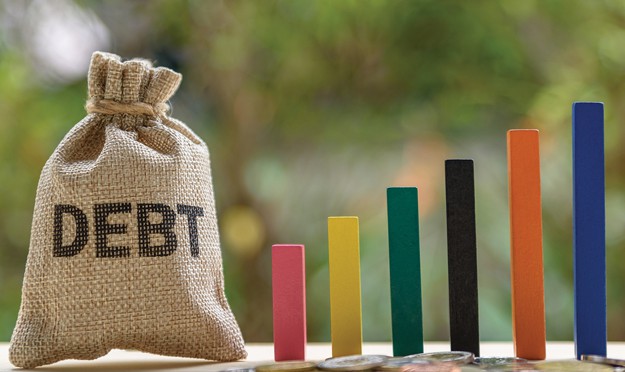Should You Invest if You're in Debt?

Here are questions that can help you determine whether you should start investing before getting rid of your debt and various factors to consider when making this decision.
How high is your interest rate?
Your first consideration when making this decision is the interest rate on your debt. Credit card debt tends to hover at 20%, on average. The stock market, in contrast, has historically returned 10% for investors. When you run the numbers, investing money you could otherwise use toward paying down high-interest debt will generally not make sense. This is especially true when interest rates on credit cards are currently rising.
If the interest rate on your debt falls under the 10% mark, it may be worthwhile for you to start investing while still carrying debt. Read on for additional considerations first, though.
How much outstanding debt are you carrying?
If your debt is so large it’s impacting your budget and making it difficult for you to get through the month, you’ll likely want to pay it off before you begin investing. Carrying a large amount of credit card debt can negatively impact your credit score.
What kind of debt are you carrying?
Not all debt is created equal. There are some good kinds of debt, which will ultimately increase your net worth or earning power. These include mortgage loans, auto loans, home equity loans that are used for home improvement projects and student loans. On the flip side is bad debt, which will not boost your equity or earning power, such as credit card debt and most personal loans.
If you want to start investing but you’re still paying off your mortgage or your auto loan, don’t let these hold you back! As good debt, these loans should not have a negative impact on your credit score and general financial health as long as you continue to make full and on-time payments.
What is your retirement timeline?
It’s never an ideal time to carry outstanding debt, but it’s especially not recommended to bring debt into retirement. If you’re nearing the end of your working years and you’re still carrying debt, it’s probably best to work on paying it off before you begin investing.
How can I invest and pay down debt?
The good news is, you don’t necessarily need to wait until you’ve finished paying off all your debts before you begin investing. If you aren’t carrying a large amount of high-interest debt, here’s how you can start investing while paying down debt:
- Continue making monthly payments toward your debts.
- Work on building an emergency fund with three to six months’ worth of living expenses.
- Consider debt relief through a debt consolidation loan.
- Boost your income with a side hustle and channel this money toward your monthly debt payments.
Use this guide to learn when and how you can start investing while still paying down debt.
« Return to "Blog"
